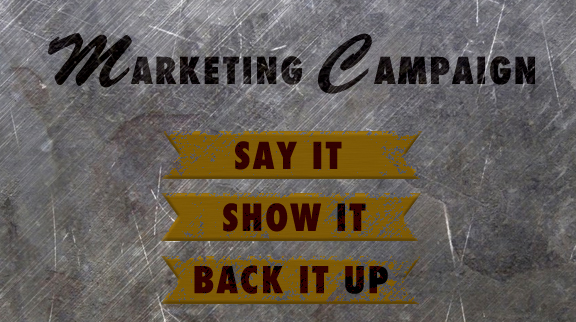 Have you ever bought a product or service based on a
marketing campaign only to find out the purchase did not live up to its
billing? My guess is we all have at one time or another. If you are in charge
of marketing, how do you keep from overselling your products and services, yet
capture the attention of your target market?
Have you ever bought a product or service based on a
marketing campaign only to find out the purchase did not live up to its
billing? My guess is we all have at one time or another. If you are in charge
of marketing, how do you keep from overselling your products and services, yet
capture the attention of your target market?
Marketing makes very bold statements about brands. It is
the job of marketing to put the brand's best foot forward. Typically this is
done with a campaign tagline (a.k.a. a slogan) that is pithy and memorable. We
hope to use words that will stick in the minds of consumers so that they define
our brand by the slogan. We position products and services as the best, the
highest quality, the most effective, etc. When you think about what you are
selling, I would imagine you have made claims about it similar to these.
However, are those slogans true or are they just a bunch of empty words? If you
can back up your marketing claims in those campaigns, you have given your
target market a reason to buy from you.
Here is a three-step process to help you make your
marketing campaigns more than just talk.
Say
it to make your brand distinct
Whenever you are building a successful marketing campaign,
your slogan has to do two very important tasks: it has to meet the wants of
your target market and it has to make a distinction between you and your
competition. First, define your target market. To whom are you selling? Next,
make a list of how your product or service can help them solve a problem or
make life easier. Next, draw up a Unique Selling Proposition. This is a
statement that defines what you are doing better to meet the customers’ needs than
your competition. From there, create your campaign slogan. Here is a tip: if
your campaign slogan can be added to your competitor’s logo and it is true of
them as it is for you, you have not made any distinction in the words you have
used. You need to start over.
Show
it to the customer
It is not enough just to state your marketing slogan, you
have to show what you are saying is true. This will tie your slogan directly to
your work. Some ways to do this are to post customer satisfaction testimonials,
write case studies where the use of your product or service solved a problem
for a client or use demonstrations of your brand at venues that attract
consumers (i.e. trade shows, lunch and learns, live point-of-purchase locations
– think grocery store samples, etc). If you can show your customer not only how
your product works, but how effective it is when it works, you will have
something to back up your words.
Back
it up
There is nothing more frustrating to a consumer than when
something you have just purchased does not live up to its billing. It fails to
work or maybe just not as well as it was marketed. If you want to be effective
in marketing, you have to understand the connection between quality control and
marketing. If your marketing has oversold your products and services, many
would argue that you need to back off your marketing. However, I would say you
need to work on your product and elevate it to meet the expectations of your
customers. No one likes to buy junk.
What is happening with your marketing claims? Are you
promoting your brand to make a distinction? Are you demonstrating the
effectiveness of your products and services to show your customers how your
brand is good for them? Are your products and services living up to your
campaign slogans or is there a quality issue? If you can say it, show it and
back it up, you will have a marketing plan that will sell well with your
customers.